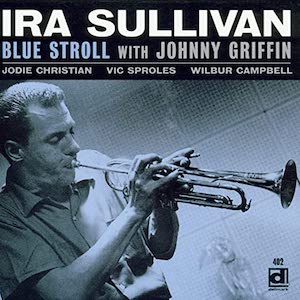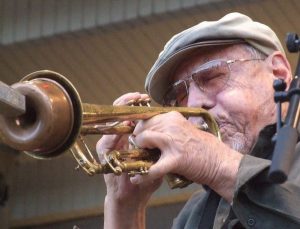Jazz Remembrance: Ira Sullivan
By Steve Provizer
In no way was the recognition that Ira Sullivan received commensurate with his skill.

In jazz, “doubling” means playing more than one instrument, but not at the same time, à la Rahsaan Roland Kirk. Certain kinds of doubling aren’t that unusual. For example, many people play trumpet and fluegelhorn, but the technique for playing those horns is essentially the same. And, while most reed players specialize in one sax (soprano, alto, tenor, or baritone) many play other members of the sax family when called on. Thanks to the clever system Adolphe Sax invented, mouthpieces must be changed, but fingering remains pretty much the same.
But the improvising musicians who can go proficiently and fluidly between playing trumpet and saxophone can be counted on one hand. Ira Sullivan, who recently died at age 89, arguably attained a higher level of technical and musical expertise in these two families of instruments than anyone else in the history of jazz. Not only did Sullivan exercise tremendous chops on both sets of instruments, but he swung like crazy: his chosen area of operation was Bop and Post-Bop, among the most technically demanding styles in jazz.
Sullivan, who came from a musical family but was self-taught, gained a strong initial reputation in his hometown of Chicago in the ’50s, gigging with the jazz elite, including Charlie Parker, Lester Young, and Roy Eldridge. In 1956, he was invited to join Art Blakey’s Jazz Messengers but he did not want a life on the road. A family-oriented guy, he quit Blakey after seven months and went back to Chicago. He then moved to Florida in the early ’60s, continued to play and teach.

The late Ira Sullivan in performance. Photo: University of Miami.
In the ’50s, he’d played with trumpeter Red Rodney (who’d been with Charley Parker) and hooked up with him again in the ’80s. The quintet played fiery and exciting music. As a trumpet player, Rodney had a better tone and wider range than Sullivan, but the technical edge between them was thin. In fact, Sullivan applied a more advanced harmonic approach than Rodney. Sullivan’s sax playing was outstanding and remained so as he moved into his 80s.
This group did some touring, so more listeners were able to learn about Ira Sullivan. He mentored younger players, like Jaco Pastorius and Pat Metheny, and was sought out to perform on recordings by Elvin Jones, Dexter Gordon, Roy Haynes, and many others. But in no way was the recognition he received commensurate with his skill. It’s not possible to determine whether or not Sullivan would have become more of a household name if he had stayed on the road or lived in New York City. But the diminished reputations of other musicians who did not follow that popular path says yes. His was an individual and brilliant voice. There are many great recordings and some live video of Sullivan and Rodney well worth checking out. After you do, you’ll wonder out loud, “Why didn’t I know about this guy?” I guarantee it.
Steve Provizer writes on a range of subjects, most often the arts. He is a musician and blogs about jazz here.

He was my Hero! Im devastated to hear this news. You will remain forever in my heart! Thank you for being someone I look up to. True American Treasure.
I truly appreciate people who knew the talents of my father, Ira Sullivan. Thank you Steve Provizer for providing this.
Sorry for the loss of your father!
I remember him playing, practicing at your home.
I’m Jim, a childhood friend from Lake Forest.
Jim !!!
My bike riding buddy from the neighborhood- I’ve never forgotten you and the great times we had growing up together. I remember your brother and mom! But mostly I remember you and your tremendous friendship and big smile thank you for reaching out. I’m afraid i’ve been a terrible communicator these past few years.
Leslie – I’m hanging out with our pal, Brennan after dinner talking about great jazz musicians. Your dad was a great pal to me and our entire family. He was super kind to my Mother, Iris Massey. We grew up listening to your dad around Miami and playing
Scrabble. We lost my mom this year.
I miss them both greatly.
God bless!
Tatiana & Craig Massey
I’m sorry for your loss and I have a few memories of Iris. You, Iris and myself have the King Mango Strut in common. I’m good friends with Antionette and was involved in a lot of the grunt work to put on the parade. Unfortunately, Iris was a great source of irritation for me as we had a strange encounter at the Lion Share when I was 16. She continued to fawn over Ira in a way that was uncomfortable for us. I guess that’s why our families never got together socially.
Here’s my tribute: Ira was a greater human being than he was a musician.
I totally concur with your observation and Thank You for contributing, Oliver.
A beautiful generous man. He gave me tremendous encouragement when I was 26 and invited me to play on his album Ira Does it All. His soulful playing and spirit will always be with us.
A half year after Ira left earth friends, fellow musicians and family are still trying to compute his absence and the life he lived with all of them. There were so very many folk. After the Florida events and move Ira did tour (he did not stay at home entirely, he was just careful not to stay out too long) I did not. Get to travel along but just now I am finishing his memoir and so if any of his friends and fans have an Ira story they would like to tell we’d love to hear them. They might enlarge the stories he told us. Thank you.
Carlena–Thanks for writing. I hope you have contact info for Bob Mover, who I know has stories about Ira. If not, let me know.
Steve
Yes. I’m in touch with Bob but he is writing a book as well so have used only a couple Ira already commented upon. But his conversations are very lively as they knew each other a long time.